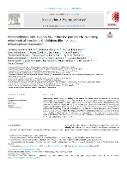Pentamethinium salts suppress key metastatic processes by regulating mitochondrial function and inhibiting dihydroorotate dehydrogenase respiration

Autor
Leischner Fialova, Jindriska
Hönigova, Katerina
Raudenska, Martina
Mikšátková, Lucie
Zobalova, Renata
Navratil, Jiri
Moturu, Taraka Ramji
Vicar, Tomas
Balvan, Jan
Gumulec, Jaromir
Datum vydání
2022Publikováno v
Biomedicine & PharmacotherapyRočník / Číslo vydání
154 (October)ISBN / ISSN
ISSN: 0753-3322ISBN / ISSN
eISSN: 1950-6007Informace o financování
MSM//SVV260521
MSM//UNCE/MED/007
UK//Q38
UK//Q27
MSM//LM2018133
MPO//FV40120
TA0//TN01000013
TA0//FW02020128
MZ0//NU21-08-00407
MSM//CZ.02.1.01/0.0/0.0/16_019/0000785
MSM//EF16_019/0000785
MSM//LM2018129
UK//Q26
UK//COOP
Metadata
Zobrazit celý záznamTato publikace má vydavatelskou verzi s DOI 10.1016/j.biopha.2022.113582
Abstrakt
Mitochondria generate energy and building blocks required for cellular growth and function. The notion that mitochondria are not involved in the cancer growth has been challenged in recent years together with the emerging idea of mitochondria as a promising therapeutic target for oncologic diseases. Pentamethinium salts, cyan dyes with positively charged nitrogen on the benzothiazole or indole part of the molecule, were originally designed as mitochondrial probes. In this study, we show that pentamethinium salts have a strong effect on mitochondria, suppressing cancer cell proliferation and migration. This is likely linked to the strong inhibitory effect of the salts on dihydroorotate dehydrogenase (DHODH)-dependent respiration that has a key role in the de novo pyrimidine synthesis pathway. We also show that pentamethinium salts cause oxidative stress, redistribution of mitochondria, and a decrease in mitochondria mass. In conclusion, pentamethinium salts present novel anti-cancer agents worthy of further studies.
Klíčová slova
Dihydroorotate dehydrogenase, Metastasis, Migration, Mitochondria, Pentamethinium salts
Trvalý odkaz
https://hdl.handle.net/20.500.14178/1851Licence
Licence pro užití plného textu výsledku: Creative Commons Uveďte původ 4.0 International







